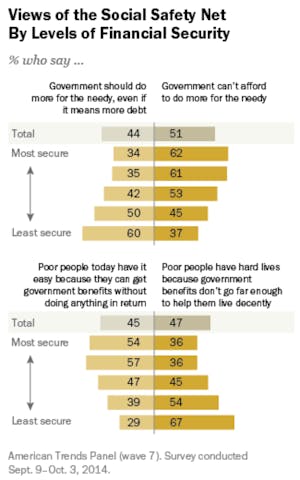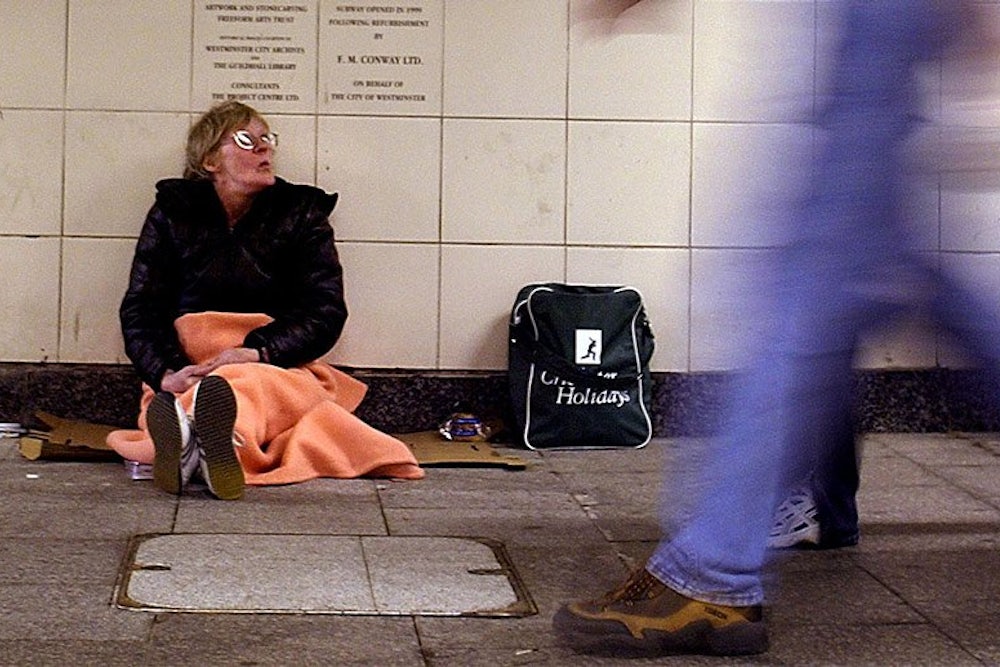If you want to see the right-wing denuded of its usual bluster about family values and welfare, visit this Economist post, published in response to Nick Kristof’s remembrance of a friend who fell on hard times and passed away. The piece argues that the problem isn’t a paucity of empathy for poor people who rely on welfare, but perhaps an excess of it; furthermore, the piece goes on to suggest that poor people who rely on disability benefits should, in order to get off of welfare, pack up and move away from family and friends in search of jobs.
“We ought to feel for those stuck in this sort of terrible quandary,” the article’s author writes. “Yet empathy can't change the fact that when people need jobs, they have to go to where the jobs are.” The quandary the author refers to is the problem of preferring to rely on disability income and to stay among family and friends rather than moving to an entirely new place alone in order to relinquish benefits. There are multiple problems with this view.

First, there most certainly is an empathy gap when it comes to well-off individuals’ view of the poor. A Pew study conducted in autumn of 2014 found that more than half of the two most financially secure groups believe poor people these days “have it easy” because of welfare. These same well-heeled groups are far more likely to favor fewer services for poor people, by wide margins compared to the least financially secure.
So empathy, insofar as it means stepping into someone else’s shoes, does appear to be more of a problem than The Economist gives it credit for in this piece, which is more or less what the Pew study would predict. But that isn’t the article’s only curious revelation. It also inadvertently admits a reality about poverty and welfare that few on the right are willing to: that poverty, rather than welfare, breaks up families; and that welfare can actually stabilize rather than disrupt the family unit.
For some time, conservatives suspicious of welfare, like Reagan’s favorite George Gilder, have argued that welfare destroys families. The mechanism is always somewhat unclear, though Gilder likes to claim that welfare “usurps the male role as chief provider and undermines the foundation of families.” Meanwhile, conservative thinkers like Ross Douthat champion the role of locality and place.
And yet, as The Economist piece points out, disability payments, as “a de facto guaranteed minimum-income programme,” allows people with disabilities to remain in places where their families live rather than chasing after work in far-flung places. In that sense, welfare of a certain stripe appears to resist the massive social dislocation brought on by free-market capitalism, wherein people must move at the whim of their employers. Contrary to the undermining-effect imagined by right-wing commentators who oppose welfare, therefore, something like a universal basic income could be extremely helpful in terms of stabilizing families and rooting communities in place.
In other words, the demands of capital and the obligations of family are often at cross-purposes rather than functioning in tandem. Contrary to the opinions of the wealthy, the poor do not “have it easy” on welfare, though public assistance might help some people remain with their support networks of family and friends rather than disappearing into the national ether in search of a job, whether or not such a job ever actually becomes available. Rather than making the case for harsher regulations on welfare, The Economist makes a good conservative case for a more expansive welfare regime: one that would really shore up family life.
